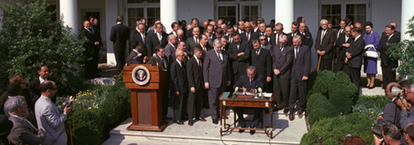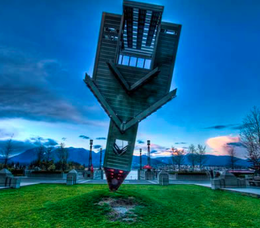 The systems (by design, default, and/or from unintended consequences) that are in place that create and sustain the conditions of poverty and our current social structures are near impossible to change. All the political and progressive rhetoric is ill-equipped to actually offer alternatives to the current conditions of poverty. Social boundaries, the ability for mobility (cultural, social, educational, economic, et al.) are mostly set in concrete, near unchangeable. Furthermore, those who have a vested interest in their own place and status (wealth, social, location, power) have no, sincere, vested interest (beyond appearance, mere rhetoric, or progressive voting) in changing the systems now in place. On the other hand, those in the bottom demographics do not have the power, do not live in geographic spaces, nor have the educational skills to make any significant change to the very complex, hierarchical-engendering, boundary rich, mobility disabling systems in place that keep most everybody in their social, economic, and cultural corners (socially, geographically, demographically, educationally, et al.) The spheres of government and of social-service (private and public) do not have the truly vested, self-less interests in making change. The appearance of change, perhaps. The rhetoric of change, perhaps. The political allegiance, perhaps. But not real, systemic changes that would actually release mobility beyond the current “corners.” When will we learn this, O Christian? Yet, as strange, foreign, and impossibly crazy as this sounds, the only space where the good life, flourishing, and even systemic social and cultural change to offer real mobility beyond our current “corners” or even truly be imagined is the gospel-rich church–literally amid local churches scattered throughout communities. Amid local churches where there is no earthly power being sought (even by its leadership), but the love of neighbor (and neighborhoods). Amid local churches where an individual’s humanity is honored, prized, and even died for is a result of believing in the gospel of Jesus Christ. This is the space, amid the early church, in which such change was nurtured and, albeit slowly, happened at the heights of the Roman empire. Where it actually outlived an empire. This is the space in which such changes have happened on small and large scales ever since. Where all lives literally matter; and, when there are lives deemed lesser, treated lesser, those lives matter more, intentionally more. The space where the hierarchies of tiered humanity are deconstructed and the alternative is constructed–that alternative is the kingdom of God, realized in Christ Jesus, and revealed through the church (literally through churches scattered in countless neighborhoods and communities). In the social and governing spheres where it takes power to make systemic changes, it will also take power to maintain such changes. And, this maintaining power is always violent. Furthermore, human nature (in the church we call it our sinful nature) will not, however, relinquish its desire for maintaining one’s advantage over others and freely disinvest its self-interests on behalf of others. So once systemic changes are make (where there is power to make such change), there will always be the powerful and powers that will seek to mark their place and status (i.e., those who make the laws have the power to enforce, by means of violence, their laws); also, there will always be those who obtained newly created social elite status, those who become affluent because of the changes and, then, will seek systems to exercise power (political and social) to maintain the new status quo (their new power). Thus, the boundaries remain and the violence to maintain them continue. This is not the way of the gospel; and, thus, not the nature of the church (read local churches scattered among communities, neighborhoods, regions). This is why the local, gospel-centered, gospel-rich, gospel-dependent, gospel-lived church is the only real space where such social change can truly be experienced. Church matters (#churchmatters).
0 Comments
 After 35+ years reading the Bible, knowing Greek fairly well so I able to read and interact with the New Testament Greek text, having memorized and studied much of the NT (for personal, ministry, and academia), and doing my best to listen to the text (I am an exegete foremost) as well as I can, getting past as much as possible the cultural, institutional, and Christendom lenses that cause me to be socially safe, institutionally protective, and (I know some hate when this is pointed out) Western, I have come to understand that we might not have the capacity to fully grasp how culturally, socially, and institutionally subversive the gospel (itself) and the writings of the New Testament truly are. Sorry for the long sentence. But, I am becoming more and more undone by the New Testament each time I approach it. I am laid bare before the Word. I am floored now to think of what, say, the apostle Paul went through to convince and demonstrate love for those in a polytheistic culture, whose understanding of what “others” (non or lesser) human beings were, and a civilization of people who were so far removed from the meaning of Jesus’ death on that cross. Multiple imprisonments. Countless beatings. I can’t even imagine the forty lashes he endured on a number of occasions—for the sake of the gospel and the sinful, corrupt, ignorant, racist, dehumanizing . . . the unaware. The stoning and being left for dead. Never to walk or stand the same again—ever. Shipwrecked. And set afloat on the wreckage for days. Sleeping on the roadside. Wondering if robbers were about. When sleep was even possible. Hunger. Thirst. Exposure. All for the love of Christ and those needing the gospel (2 Corinthians 6, 11, 12). I cannot imagine this in my safe, Christianized world. I am now unsure whether we, whether I, frankly, follow in these footsteps as we should be (“Brothers, join in imitating me, and keep your eyes on those who walk according to the example you have in us,” Phil 3:17). I fear we have more so become, as Paul told us with tears, “enemies of the cross of Christ” (Phil 3:18), whose “god is their belly, and they glory in their shame, with minds set on earthly things” (v. 19). I wonder if we, if I, truly believe that “our citizenship is in heaven," and whether we truly “await a Savior, the Lord Jesus Christ, who will transform our lowly body to be like his glorious body, by the power that enables him even to subject all things to himself” (vv. 20-21). I think I'd live so very differently, if I truly believed this. I am now so amazed--aghast, is really the word—that we have so succumbed to the ways we do things as church in the western march of Christendom that we cannot fathom church any other way than how we experience church now. I am equally aghast at my own shallow level of understanding the gospel that leaves me safe and privileged. I am undone at my own inability to fathom what Jesus meant when he commanded that we “love one another.” I am humbled to think I have not made the link that Paul made from the cross, the death of Jesus, to the reconciliation implied by the power of the blood (Ephesians 2:11-22). I am so protected from the subversiveness of the gospel and rest way too easily in knowing I have my ticket to heaven. I have a safe Christianity. A safe discipleship. A safe gospel. And, a safe ecclesiology (i.e., a safe church).
At nearly 60, I am re-learning (maybe re-hearing and listening better is a better way of saying it) what Paul wrote to the church at Philippi while in chains for the gospel in some jail cell: “But whatever gain I had, I counted as loss for the sake of Christ. Indeed, I count everything as loss because of the surpassing worth of knowing Christ Jesus my Lord. For his sake I have suffered the loss of all things and count them as rubbish, in order that I may gain Christ and be found in him, not having a righteousness of my own that comes from the law, but that which comes through faith in Christ, the righteousness from God that depends on faith—that I may know him and the power of his resurrection, and may share his sufferings, becoming like him in his death, that by any means possible I may attain the resurrection from the dead.
At the dawning of my 60th year, I hear again Paul. So easy to forget what lies behind when what lies ahead is basically more of the same that has kept me safe, Christianized, and somewhat well fed and sheltered. Altogether different in a jail cell for the real gospel that compelled him to strain forward to what lies ahead--more jail cells, beatings, and death for those who need the gospel. “Not that I have already obtained this or am already perfect, but I press on to make it my own, because Christ Jesus has made me his own. Brothers, I do not consider that I have made it my own. But one thing I do: forgetting what lies behind and straining forward to what lies ahead, I press on toward the goal for the prize of the upward call of God in Christ Jesus. Let those of us who are mature think this way, and if in anything you think otherwise, God will reveal that also to you (Philippians 3:4-11). This is what I am thinking, praying . . . I know what needs to be forgotten . . . wondering what lies ahead.
|
AuthorChip M. Anderson, advocate for biblical social action; pastor of an urban church plant in the Hill neighborhood of New Haven, CT; husband, father, author, former Greek & NT professor; and, 19 years involved with social action. Archives
February 2024
Categories
All
|
Pages |
More Pages |
|

 RSS Feed
RSS Feed